Venezuela – Democracy in Action
Venezuela – Democracy in Action
by Julie Webb-Pullman
In a country where the electoral rules strictly honour and serve the rights of the people rather than the other way around, polling booths didn't close until almost midnight, so that everyone waiting in a queue could exercise their Constitutional right to vote. Although opposition candidates began clamouring for closing of the booths from 4pm, the President of the Electoral Council Tibisay Lucena repeated continually on national television that the booths would NOT close until everyone who wanted to, had voted.
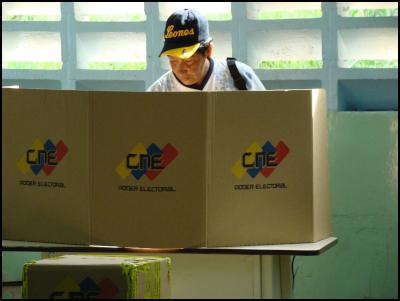
Click to enlarge
Casting an electronic vote behind the screen
Visiting polling booths throughout the day to observe the process and talk to the locals revealed an extremely high level of voter confidence in the process. With 100% electronic voting backed up by a paper-trail, two thumb-prints required for identification prior to voting, and a purple-stained pinky once they'd done so, irregularities were confined to minor infringements. Some 106 people out of 10 million voters were fined for irregularities such as ripping up the paper receipt instead of putting it in the paper ballot box in case a recount was needed – a number unlikely to realistically affect any challenged outcome!
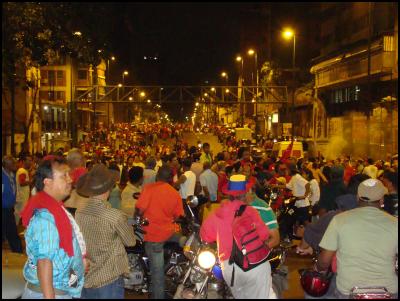
Click to enlarge
Crowds throng the streets around Miraflores Palace waiting for the results
Voters were universal in their praise for the conduct of the elections and other electors, citing the calm respectful atmosphere as a first. Although opposition and PSUV voters were sometimes queued together for several hours in the hot sun, which might have been expected to frazzle tempers and spill over, it just didn't happen. All interviewees were adamant that everyone had the right to vote, and to have their opinion respected, and they were all happy not only to demand that respect for themselves, but also to accord it to their fellow citizens.
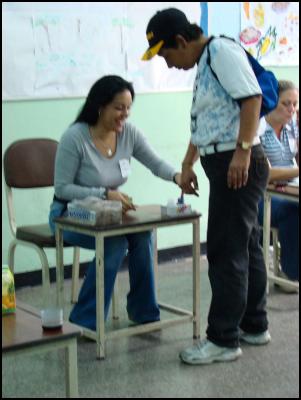
Click to enlarge
Dipping the pinky after voting
The elderly and people with disabilities had their own line, and were prioritised through the system. People on crutches and in wheelchairs were carried up and down flights of stairs as necessary, under the watchful eye of the National Guard.
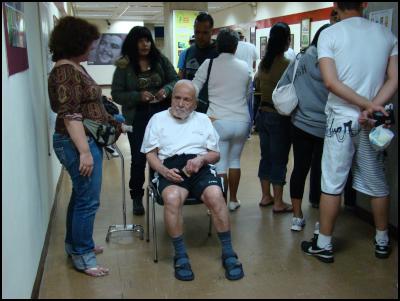
Click to enlarge
Priority given to elderly and people with disabilities
Record
Turnout
Some 65% of voters turned out, making it the
highest ever recorded for regional and municipal elections.
Despite the increased turnout over last year's referendum
vote, the proportions of support were little different from
previous elections – about 6 million votes (70%) to
Chavez-supporting United Socialist Party of Venezuela
candidates (PSUV), and 4 million (30%) to the opposition.
PSUV thus managed to pick up another million or so who
abstained last year, while opposition support remained
static.
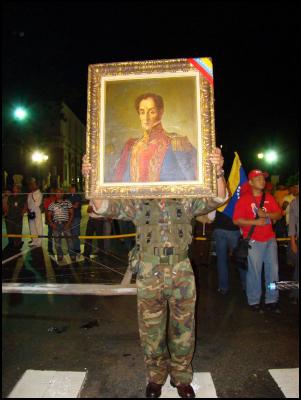
Click to enlarge
Simon Bolivar presente!
Caracas goes
Right
However there were a few surprises – the
Mayoralty of Caracas was lost to the opposition, and as they
also took five of the six surrounding mayoralties it will
make for a tough four years for Chavistas to maintain their
revolutionary momentum in the capital. Although they'll be
assisted by an 8-12 Chavismo majority in Council in Grand
Caracas, which should see some pretty interesting debates,
there is concern whether continued funding of numerous
social initiatives by the local consultative councils will
be the first victims of the incoming Mayor.
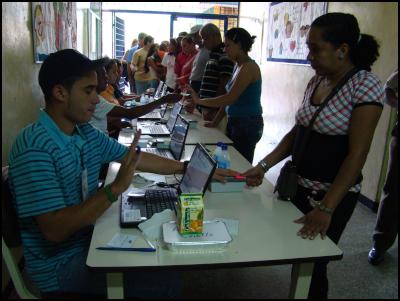
Click to enlarge
Thumbprint check at San Antonio
The opposition also picked up the governorships in Miranda, Carabobo, and Tachira, demonstrating what is considered to be widespread grassroots dissatisfaction amongst Chavistas with gross mismanagement and lack of confidence in the Chavista incumbents, especially Bernal in Libertador and Rangel in Pitari.
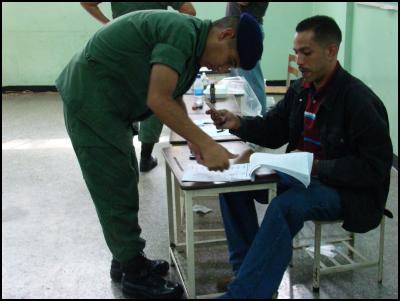
Click to enlarge
Thumbrint onto electoral roll list before voting
The opposition didn't have it all their way – in the two states of Aragua and Sucre turncoat-Governors of the party Podemos who were elected under Chavismo last elections but jumped the fence into the opposition camp during their term, were rewarded by being ousted by the voters, and replaced by genuine Chavistas.
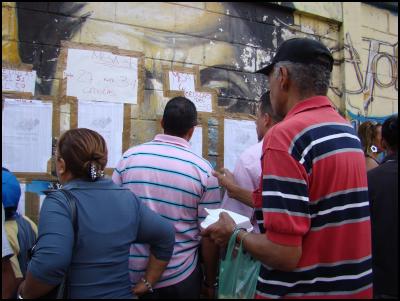
Click to enlarge
Voters at San Antonio finding their electoral 'table'
Not a Vote Against
Chavez
Overall, the result saw 17 out of 23
governorships go to the PSUV, while only 6 went to the
opposition. While the loss of three governorships to the
opposition is clearly food for thought for the PSUV, who are
already dissecting the results, it would be a grave error to
interpret these losses as a vote against Chavez. This is a
party only some six months old, after all, and they did
manage to wrest back two states from the opposition. If
anything, it reaffirms the commitment of over 70% of voters
to the Venezuelan socialist project of the 21st Century, a
majority enjoyed by few western democratic
governments.
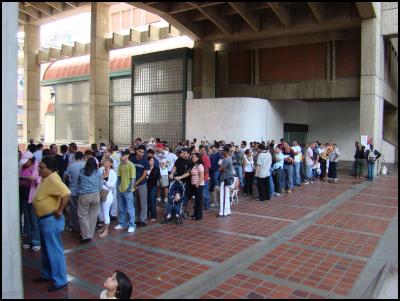
Click to enlarge
Voters queue outside the National Library in Caracas
Chavez himself warned several months ago that the opposition would have three theatres of operation in which they would concentrate their efforts – "half-moons" in the east and west, and Caracas in the centre. While the opposition was successful in getting their half-moon in the west with Zulia and Tachira, they missed out on Sucre and Monargas in the east, getting only Nueva Esparta, and managed only partial success in the centre with Carabobo and Caracas. Given that two of the candidates were not even the preferred candidates (who were barred from standing because of corruption charges), the opposition may well have garnered even more support – food for thought for the PSUV.
Lessons
While the PSUV searches
its soul over the next few months, some of the issues they
are sure to be addressing include pre-selection processes,
given the widespread dissatisfaction on the ground with many
of the PSUV candidates. Disillusionment with the slow rate
of change is another issue they will no doubt be looking at,
and taking up.
The considerable success of the PSUV in mobilising at the local level is an extraordinary achievement in such a young party, and is a base that will surely continue to be built upon.
As Chavez said after the results were announced, these elections reaffirmed that the overwhelming majority of Venezuelans want to continue moving towards socialism. He also emphasised that the results give no grounds for a coup, and that the country's laws will be applied to ensure the expressed wishes of the people are upheld. Viva democracy!!


 Keith Rankin: Make Deficits Great Again - Maintaining A Pragmatic Balance
Keith Rankin: Make Deficits Great Again - Maintaining A Pragmatic Balance Richard S. Ehrlich: China's Great Wall & Egypt's Pyramids
Richard S. Ehrlich: China's Great Wall & Egypt's Pyramids Gordon Campbell: On Surviving Trump’s Trip To La La Land
Gordon Campbell: On Surviving Trump’s Trip To La La Land Ramzy Baroud: Famine In Gaza - Will We Continue To Watch As Gaza Starves To Death?
Ramzy Baroud: Famine In Gaza - Will We Continue To Watch As Gaza Starves To Death? Peter Dunne: Dunne's Weekly - A Government Backbencher's Lot Not Always A Happy One
Peter Dunne: Dunne's Weekly - A Government Backbencher's Lot Not Always A Happy One Richard S. Ehrlich: Cyber-Spying 'From Lhasa To London' & Tibet Flexing
Richard S. Ehrlich: Cyber-Spying 'From Lhasa To London' & Tibet Flexing